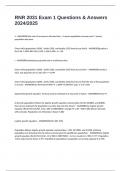2024/2025
λ - ANSWERSFinite rate of increase in discrete time, >1 means population increase and <1 means
population decrease
Given initial population (1000) , births (300), and deaths (250) how do you find λ - ANSWERSEquation is
Nt+1/Nt. 1,000+300-250=1,050. 1,050/1,000= λ= 1.05
r - ANSWERSInstantaneous growth rate in continuous time
Given initial population (1000) , births (300), and deaths (250) how do you find r - ANSWERSFormula is
ln(λ). Just plug into calc so ln(1.05)= r= 0.049
Given initial population (1000) , births (300), and deaths (250) how do you find the size of the population
in 6 years - ANSWERSUse formula Nt=N0e^rt. 1,000e^(0.049)(6)= pop. in yr 6=1342
Exponential growth equation. Formula used to estimate N at any point in future - ANSWERSNt=Noe^rt
A discrete population follows the logistic growth equation and provides r(0.02), N0(680), and K(800).
How do you estimate the population one time step into the future? - ANSWERSUse logistic growth
equation dN/dt=rN(1-(N/K)). 0.02 x 680 (1-(680/800))= triangle N= 2.04 + 680 is 682 (Never decimals
with animals). Population one timestep in future is 682
Logistic growth equation - ANSWERSdN/dt=rN(1-N/K)
Population follows logistic growth equation and provides r (.03), N0 (980), and K (900). Estimate
population one timestep into the future and also give the equilibrium population. - ANSWERSUse logistic
growth equation dN/dt=rN(1-N/K). .03 x 980 (1-(980/900))= -2.61 so round to 3, 980-3= 977. Population
1 time step into the future is 977. Equilibrium population is population at carrying capacity K so 900
, K - ANSWERSCarrying capacity
Population is growing according to logistic growth equation provides K (6,000) and rate per month of r
(0.05). What is the maximum possible growth rate of the population? What if you double K? What if you
double K and r? - ANSWERSUse growth peak equation k/2. k/2=3,000 so N=3,000. Now use logistic
growth equation dN/dt=rN(1-N/K). So 0.05 x 3,000 (1-((3,000/6,000))= 75= max growth rate is 75 per
month. For the doubling just use the same equation with appropriate values
Growth peak equation (Population at MSY) - ANSWERSk/2
A population is growing provided r (0.12) and k (3,600). At what population size is harvest maximized?
What is the annual maximum sustained yield at that population? - ANSWERSFirst use k/2=3,600/2= Pop
size 1,800 harvest max. Then MSY=rk/4= (0.12)(3,600)/4= annual MSY is 108
MSY/Most sustainable yield - ANSWERSrk/4
Pleistocene extinctions (causes) - ANSWERSHumans and Younger Dryas climate change, both at same
time very bad. Arrival of Clovis people coincides with the extinctions of at least 17 megafauna genera in
North America.
Extinctions by continent - ANSWERS50 SA Unknown, 33 NA Mostly humans some climate, 21 Australia
Humans, Asia 9 mostly climate, 8 Africa unknown
Modern extinctions and near extinctions - ANSWERSo The Dodo - extinct in 1662
o Great Auk - extinct in 1844
o Labrador Duck - extinct in 1875
o Canvasback Duck - Near extinct due to market hunting (ended in 1918)
o American Bison - Near extinct by 1889
o Passenger Pigeon - Extinct 1914
o Carolina Parakeet - 1914
o Heath Hen - 1932
o Eskimo Curlew - 1968


